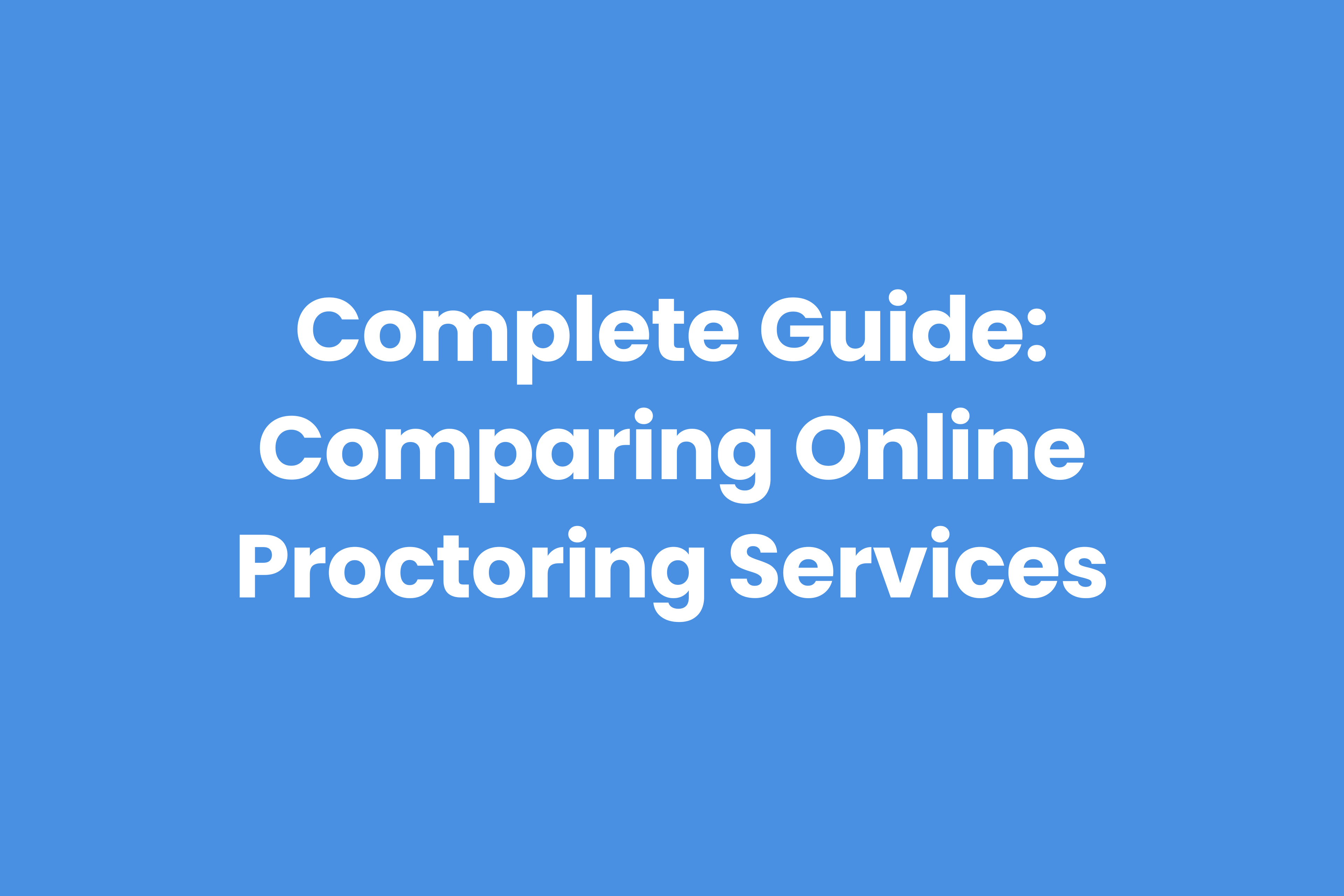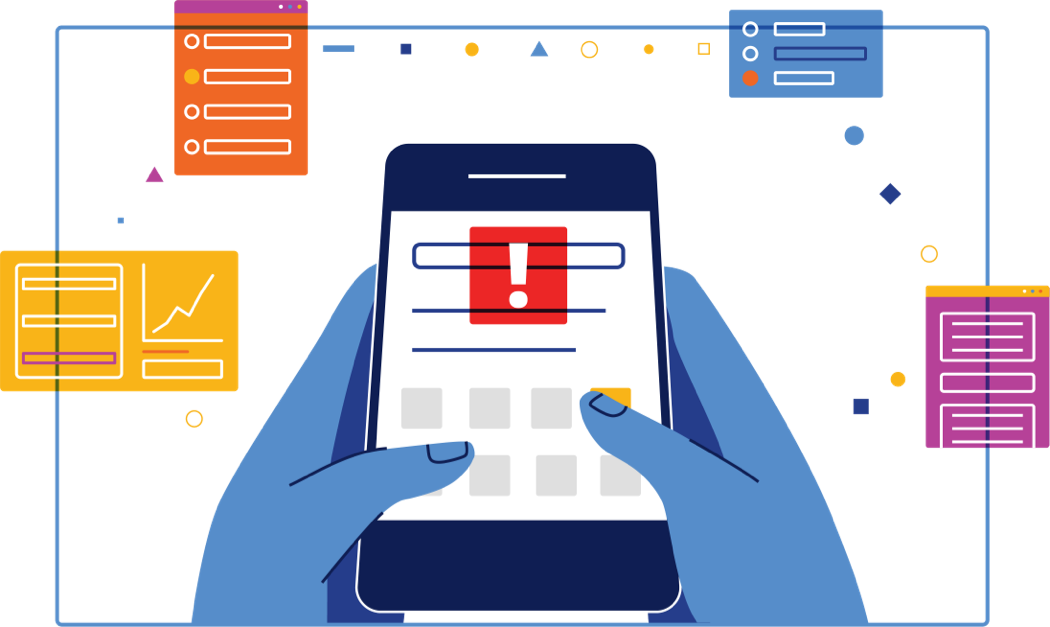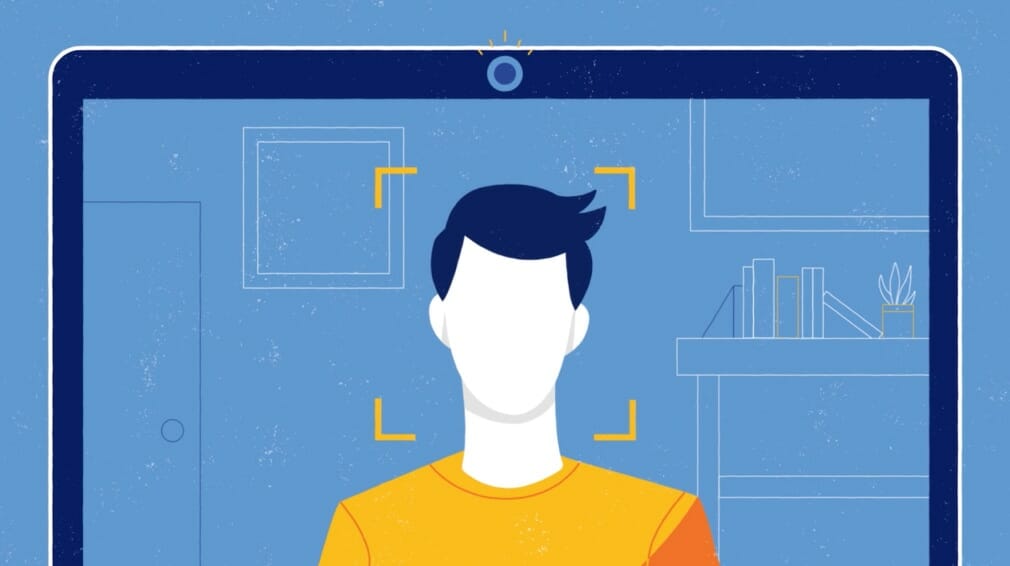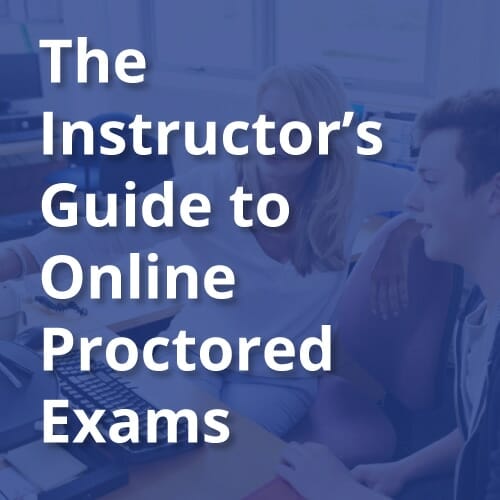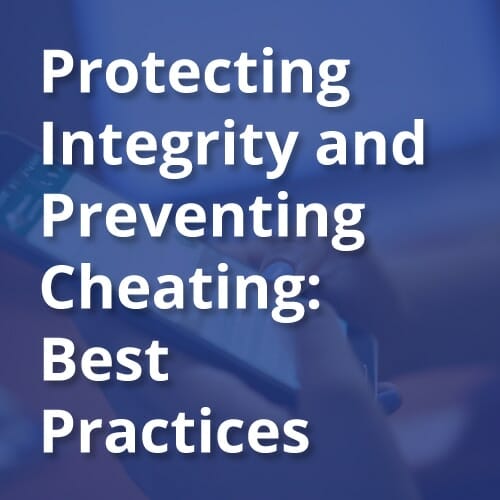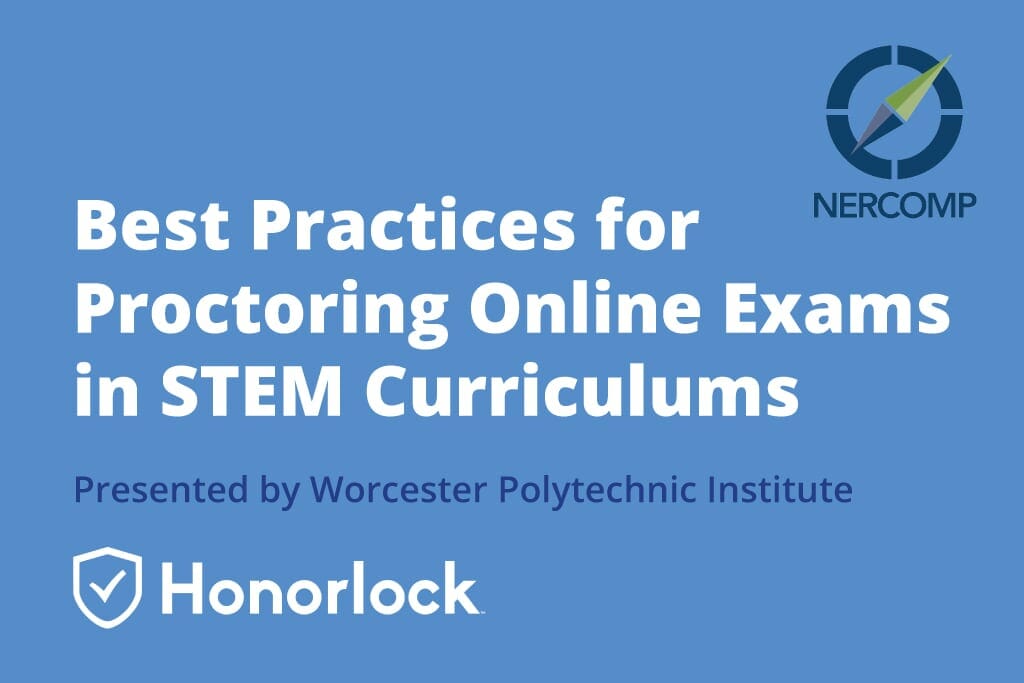When you compare online proctoring services, you may be surprised to find that they come in many shapes and sizes.
- Can the proctoring software detect cell phone use?
- Does it protect my exam questions from being posted on unauthorized test banks?
- Are proctored exams easy to use to set up for faculty and students?
- Is a flat-rate cost or will it cost more for variable requirements?
- Does the proctoring software integrate with our Learning Management System (LMS)?
- How does it ensure that student data privacy?
- How long does it take to implement?
Click any part below to skip to that section
- Part 1: What is online proctoring and why is it needed?
- Part 2: What are the four types of online proctoring?
- Part 3: What should I ask about proctoring software features and functionality?
- Part 4: What should I ask about implementation, training, and support?
- Part 5: What are the cost structures and how do you avoid additional costs?
Part 1: What is online proctoring and why is it needed?
Online proctoring, sometimes referred to as remote proctoring, monitors students during an online exam using software and/or live proctors to:
- Prevent cheating and protect exam integrity
- Preserve accreditation
- Improve student success
- Scale online programs at an affordable cost
Some proctoring services use one method or a combination of both to effectively proctor online exams.
How does online proctoring protect accreditation?
Some online programs are required by law to verify identification. This is to ensure that the person taking the proctored exam is the same student enrolled in the course.
According to the federal government’s 2008 Higher Education Opportunity Act, higher education institutions that receive Title IV funding are required to verify the identity of enrolled online students by at least one of the following methods:
- Online proctored exams
- New or other technologies and practices which verify identify
- Secure login and password, such as a Learning Management System (LMS)
Improving student success
The right proctoring service will offer your students two key things: convenience and academic rigor.
Proctored exams can help provide online courses with the same level of quality as in the classroom with more flexibility. Students can take online exams at a time that works for their schedule and get needed support at any time
Part 2: What are the four types of online proctoring services?
Common methods of online proctoring services:
- Browser lockdown software
- Automated proctoring
- Live proctoring
- Blending automated proctoring and live online proctoring
Browser Lockdown Software
What is browser lockdown software?
Test software tools like browser locks are used to prevent students from accessing other browsers, websites, or applications during an exam and to also restrict certain function keys and keyboard shortcuts. A browser lock is a starting point for proctoring online exams but lacks many features that address academic dishonesty.
How does a browser lockdown work?
They integrate with the LMS and prevent students from accessing websites, applications, and keyboard functions during the exam.
What are the benefits of a browser lockdown?
- Easy to implement
- Simple functionality prevents one aspect of academic dishonesty
- Printing and screen capture is disabled
What are the issues of using a browser lock?
- They only address one aspect of academic dishonesty
- Students can easily work around a browser lock to find answers and cheat
- If no other proctoring software is used along with the browser lock, a student can use their cell phone to search for answers or refer to their class notes
Automated Proctoring
What is automated proctoring?
Automated proctoring, also referred to as AI proctoring, uses AI software to monitor students during the online exam.
How does automated proctoring work?
- A student sits down for the online assessment, verifies their identity, and then starts the exam
- AI technology monitors the student during the online exam
- Someone reviews the recording of their session and prepares a report for the instructor
- The instructor can also review the session recording to better evaluate any flagged incidents
What are the benefits of automated proctoring?
- No one has to be present during the online exam
- Students can access online exams day or night
- Reports provide critical details about student behavior
- Instructors can easily review reports and decide if any academic dishonesty has occurred
What are the issues with automated proctoring?
- Cheating is addressed after the exam
- AI can miss some potential academic misconduct
- The exam recording has to be reviewed in its entirety which can be a lengthy process
- The lengthy review process delays grading, which can frustrate faculty and students
Live Proctoring
What is live proctoring?
Proctoring services that aren’t using automated proctoring typically use live remote proctors who watch students as they take the exam.
How does live proctoring work?
- Live remote proctors watch the student while they take their online exam to ensure that academic integrity is upheld
- Remote proctors can intervene if any issues arise
- After the online exam, live remote proctors create an exam report and send the recording to the instructor for review
What are the benefits of live proctoring?
- Live proctoring means that you get many of the same benefits of proctoring an in-person, on-campus exam
- Having a human monitor the online exams can make instructors more comfortable with the integrity of their exams
- Live remote proctors can communicate with students in real-time
- Sessions are still recorded so instructors can review if needed
What are the issues with live proctoring?
- Live remote proctors are often watching multiple students simultaneously, which increases the chance of missing incidents
- Students know they’re being watched which can increase exam anxiety and negatively impact exam performance
- Scheduling is a hassle because students have to schedule ahead of time and align with the availability of the remote proctor
- Some students have described live proctoring as “creepy” because the proctor is visible on their desktop throughout their exam
Blending AI Proctoring and Live Online Proctoring Services
Proctoring services such as Honorlock combine AI and live remote proctors to prevent cheating, protect academic integrity, and support students throughout.
How does Honorlock’s online proctoring services work?
- Students can schedule and take their exam at any time – 24/7/365
- AI monitors the student during the exam and prompts a live human proctor to enter if any issues are detected. This means that when a proctor is alerted, their attention is on one student only
- Proctors can review the situation before intervening, which provides a less intimidating and non-invasive exam experience
- Faculty save time when reviewing the assessment report because they don’t have to review false flags
- Actionable exam reports and recordings are provided to instructors
Ultimately, you should carefully evaluate and compare online proctoring services and decide what works best for your institution.
Part 3: What questions should I ask about proctoring software features and functionality?
There are seemingly endless features and functionality to consider when you compare online proctoring software.
You’re not just preventing cheating and protecting academic integrity, you’re also setting your faculty and students up for success.
Use these questions to drive your conversations with online proctoring companies:
Can the proctoring software detect the use of cell phones and other devices?
This is an important problem that most proctoring services haven’t solved, yet most students have a cell phone, a tablet, or even a smartwatch. As technology advances, your testing software needs to advance along with it.
Follow-up question: Does the proctoring software capture a screen recording of the specific sites visited by these devices and provide it to the instructor?
How does the proctoring software protect your exam questions and answers from unauthorized use on the internet?
Faculty spend a lot of time crafting exam questions that will allow students to demonstrate their newly gained knowledge. It’s frustrating when these questions are copied and shared with common study sites such as Quizlet, Chegg, and Coursehero.
Follow-up question: Does the proctoring software you’re considering automatically take steps toward removing that exam content from unauthorized sites?
Does the proctoring software integrate with your LMS?
The online proctoring software should directly integrate with your LMS, such as Canvas, Blackboard, and D2L Brightspace, so that faculty and students can work in a testing environment they’ve already mastered. The LMS integration should also allow you to operate within your LMS without requiring additional logins and passwords.
Follow-up questions:
- How long does the integration process take?
- Does the proctoring solution natively acquire your institution’s branding in the LMS?
Can you proctor third-party exams such as Cengage, Pearson, and McGraw Hill?
When faculty need to administer exams outside of your LMS, they need a proctoring solution that will provide effective evaluation while preventing academic dishonesty. Make sure your proctoring software seamlessly works with third-party systems.
Is real-time reporting available? If not, how long does it usually take to receive exam reporting?
Many online proctoring systems can take up to three days to provide exam recordings for faculty review. After that, faculty need to log into a third-party system for access. Make sure that the online proctoring service provides timely access to exam reports and recordings.
Follow-up questions:
- Are the proctored exam reports provided within your LMS?
- Is there an additional cost associated with reporting?
When can students schedule and take their online exams?
With live proctoring, students usually find that they have to schedule their exam time in advance. Limited proctor hours can prevent students from being able to take the exam when they are most ready and most alert. This creates headaches and frustration. Be sure that exam scheduling is on-demand to provide a smooth experience for your students.
Follow-up question: If the proctoring software requires scheduling ahead of time and a student needs to reschedule their online exam, will they be penalized?
Does the proctoring software have voice detection?
Online proctoring solutions with voice detection features are often sensitive to sounds which can cause over-flagging. This sensitivity is not only annoying for your faculty but also causes unneeded stress for students. Ideally, you’ll find proctoring software with robust voice detection that reduces false flags. This also gives students who like to read questions aloud the peace of mind that they will not be flagged inappropriately.
The voice detection AI should go beyond simply listening for a voice and have the capability to identify common phrases, such as “Hey Siri” or “OK Google,” to identify students who may be attempting academic dishonesty. Additionally, instructors and administrators should be able to create and update a list of dynamic words and phrases specific to their needs.
Follow-up questions:
- Is the voice detection in real-time?
- When an issue arises, the proctoring software should alert a live proctor who can enter the exam session to determine whether the student is acting appropriately
- Does the proctoring software provide a written transcript when a voice is detected?
Does the online proctoring service quickly verify the student’s ID?
Many online proctoring services state perform identity verification, but how? Be sure to ask.
The software should read the content on the student’s ID and match it to the student’s name and information in your LMS before the student is can launch the proctored exam.
Follow-up questions:
- How long does the proctoring software typically take to verify a student’s ID? 60 seconds, a few minutes?
- Does the online proctoring service charge extra for ID verification?
Is the proctoring software easy to use?
If you’re investing in online proctoring software, make sure it will actually be used by your faculty.
Easy-to-use proctoring software will actually get used. This is important because it can be the difference between true technology adoption and a better proctoring experience vs wasting money on a platform that isn’t being used.
Follow-up questions:
- What features save instructors time?
- What steps are involved for instructors to enable a proctored exam?
- There should be minimal steps required: Instructors should be able to create exams like they normally would and select the proctoring features to use.
- The software should also fully integrate with the LMS which means no additional logins or passwords.
Can you customize online exams based on accessibility needs?
Accessibility in the classroom is ever important and instructors need the ability to create specific instructions for any student requiring accommodations. It’s also important to review the company’s VPAT and have it validated by your team.
Follow-up question: What assistive technologies are supported by the online proctoring solution?
Common assistive technologies are:
- Natural Reader
- JAWS
- NVDA (NonVisual Desktop Access)
- Text2Speech
- Ultra Hal TTS Reader
- TTS Add-ons for Browsers.
- SpeakIt!
- FoxVox
- SpokenText
- SpeakingFox
- Talkie
- Chirpy 2.0
- Read Aloud
How does the online proctoring service protect student privacy?
Student privacy is incredibly important to students, instructors, and institutions. It should be a top priority for online proctoring services as well. Obtain the online proctoring company’s privacy policy which should address why and how they’re protecting student data.
Follow-up questions:
- What data is collected by the online proctoring service and why is it needed?
- Does the company sell or share student data?
- How long is data kept by the online proctoring service?
How does the online proctoring service secure your data?
- Is the proctoring software reliably hosted by a cloud service provider?
- Are employees of the online proctoring service trained and certified in FERPA and Data Protection?
- Does the online proctoring service have the company’s data, security, and business practices audited annually by independent third parties to obtain certifications such as SOCII?
- Is the online proctoring company GDPR compliant? This information should be readily available on their website.
Part 4: What should I ask about implementation, training, and support?
Critical variables that are often overlooked when purchasing online proctoring technology are implementation, training, and ongoing support.
Online proctoring implementation should be streamlined, project managed and fully supported during and after
Implementation
How long does it take to implement the proctoring solution?
You need a quick and easy implementation that takes a few days, not weeks or months. This ensures that you’re getting your money’s worth as early as possible.
To set your institution up for success, you’ll want to establish a few things before you begin the implementation:
- What’s your go-live date?
Once the go-live date is established, the full implementation including training and onboarding sessions take place - Who are your administrators?
This is the list of who at your school should have admin accounts (list names and emails) - What dates and times are open for your team?
Training
Training should be thorough and leave your faculty with confidence moving forward. Be sure that the online proctoring service provides ongoing training materials and 24/7/365 support for students, faculty, and administrators.
What training for online exam proctoring is available?
Ask the online proctoring service to provide a sample training plan that details each segment and the goals.
What ongoing training resources are available?
Online proctoring services should include resources such as quick reference guides, FAQs, and technical information for users. An added bonus is holding pre-semester webinars that cover commonly asked questions by other customers.
Customer Success Managers
Whether you have feature requests or want help, make sure that the proctoring service includes a dedicated Account Manager or Customer Success Manager to help you along the way.
Support for faculty and students
Since education is an around-the-clock endeavor, remote proctoring support for your faculty and students should be too.
Ask these questions to ensure that you’re receiving the best support possible:
- What are the support hours of operation?
Student support should be readily available anytime, 24/7/365, for your students and faculty. - Does the proctoring service include technical support or is it an additional cost to the online proctoring software?
Technical support for online proctoring software is often an added expense. To keep your costs under control, make sure that the online proctoring service includes this price along with the software. - How is support provided?
Ideally, instructors, students, and administrators will have multiple options to connect with a human for support such as support via phone, live chat, and email.Follow-up questions:- Is support built into the remote proctoring software or do users have to go to a different program or application?
- Is remote proctoring support provided in real-time?
- Will your faculty and students speak with a human or a bot?
Part 5: What are the cost structures and how do you avoid additional costs?
Each instructor, not to mention each course, has variable requirements for proctored online exams. This can lead to unfair hikes in cost.
To avoid unfair online proctoring cost hikes, ask the following questions:
- Do you charge a flat rate per online exam/student or does the cost vary?
- With flat rates, you’re able to protect your bottom line and better estimate online exam proctoring costs. As an example, when online proctoring services charge per hour, you may pay twice as much for longer proctored online exams.
- Do students have to pay extra to reschedule an exam?
- Some live proctoring services require that students pay a fee to reschedule the exam.
- Are implementation and training an additional cost
- Be cautious of additional costs such as implementation and training, which can be tossed into the contract at the last minute or added later. To provide the best experience possible, online proctoring services should provide implementation and training at no additional cost.
Honorlock Online Proctoring Services
Honorlock combines AI and live remote proctors to protect academic integrity. We make online proctoring simple, easy, and human.
Additionally, Honorlock’s online proctoring services can be implemented in as little as two days and provides 24/7/365 faculty and student support.
The benefits of Honorlock’s proctoring services:
Cell phone detection
Honorlock not only detects the use of cell phones, tablets, and other devices – our patented AI captures a screen recording of the violation to provide evidence of academic dishonesty. This helps deter students from using their phones out of view and you get to proctor beyond the webcam.
Combine AI and live test proctors
Honorlock combines the benefits of AI with those of a live test proctor. Our remote proctoring software partners with our trained proctors to reduce test anxiety and provide human support while upholding exam integrity.
Our AI software monitors each exam session for problems and alerts a live, US-based proctor to join the session to address possible dishonesty. Our software equips the proctor with an analysis window so they can review the situation before entering the exam session via chat-box to address the situation.
Detect voices
Honorlock’s Voice Detection feature goes beyond by listening for specific keywords or phrases, such as “Hey Siri” or “OK Google,” to identify students who may be attempting to cheat on an exam. If the AI detects any dishonesty, it alerts a live proctor in real-time to pop into the exam session via chat to intervene and redirect the student.
Our AI delivers a more robust voice detection system that reduces false flags, such as dog barking. Honorlock also provides a written transcript to instructors whenever a student’s voice is detected.
Reduce illicit exam content from the Internet
Once you enable Honorlock in an online exam, our test bank removal technology, Search and Destroy™ searches the Internet for leaked online exam questions.
Plug and play LMS integration
Honorlock’s online proctoring software directly integrates with your LMS.
This also means no additional sign-ons or passwords for faculty and students – in just a few clicks, your students and faculty are ready for the proctored online exam.
Remote proctor third-party exams
Our proctoring software provides instructors with the ability to proctor third party exams with MyMathLab, ALEKS, Pearson, McGraw Hill, and others. Faculty can easily register third party online exams and customize exam settings in the LMS.
Actionable reporting
Extensive data is collected during the proctored exam in the institution’s LMS. Reports on student activity are provided at no additional cost to the institution.
Honorlock’s analytics provide quick results for a number of potential violations. For instance, if the student’s face goes outside the view of the camera, the violation is detected and available to the instructors via the Honorlock dashboard. The detailed reports that are available to each instructor include violations and any suspicious behavior/activity.
24/7/365 exam scheduling
Students can take online proctored exams with Honorlock at any time—even if it’s at 2 am over Thanksgiving break.
Verify student ID in 60 seconds
Honorlock’s proctoring software quickly captures the content on the student’s ID along with their photo so you can be sure the student taking the proctored online exam is the student getting credit.
Easy to use and quick to set up
Honorlock was designed with the user in mind and removes much of the manual labor involved. Additionally, the LMS integration makes setup quick and simple.
The instructor creates their test in the LMS as they normally would, and then simply clicks “Enable” and the test is ready for online proctoring. And it’s just as easy for the student.
Protect student data privacy
Student privacy is incredibly important to students, professors, and Honorlock.
Here are a few keys to remember about Honorlock’s approach to student privacy:
- Honorlock is FERPA compliant
- Honorlock does not sell or monetize student data
- Honorlock does not use any student data for anything other than carrying out online exam proctoring services
- Only appropriate school personnel have access to student data
- Key staff from Honorlock will have access if needed to help provide quality control and support for instructors.
- Your school owns the data
- Honorlock uses an encrypted and secured connection during each online proctored exam. All videos and photos are stored on Honorlock’s platform. All data, including photos and video, is stored in an encrypted format on isolated storage systems within Honorlock’s private cloud in Amazon’s AWS U.S. data centers.
- We store data in accordance with your institution’s MSA
- After the specified time of your MSA, all student-related data is automatically purged unless the university requests an extension of a particular student’s data related to an academic integrity case. Upon request from the university, Honorlock can extend the data retention of a student’s data up to an additional 12 months.
Implementation can be completed in 2 days
Honorlock’s implementation is streamlined, project managed, and fully supported throughout to ensure your success and that faculty feel confident and will actually use the proctoring software.
Training and ongoing training materials
Training is available for instructors and staff at no additional cost.
Honorlock also provides a comprehensive list of quick reference guides, help articles, and videos for faculty and students. This includes resources provided to the admin to assist in student orientation and training. The guides and tutorials are effective as a means of providing ongoing training for new faculty and administrators.
24/7/365 support for students and faculty
Just like our online exam proctoring, our support is on-demand 24/7/365. From implementation to proctoring online exams, our US-based, trained support agents are available via phone (faculty only), live chat, and email. Support access is available within the online proctoring software in real-time and you’ll speak with a real person.
Fully accessible and customizable online proctoring software
Honorlock is ADA accessible and compliant with Section 508 of the Americans with Disabilities Act.
Honorlock has also been developed and tested to conform to WCAG 2.0 level AA guidelines for accessible use. Conformance to accessibility guidelines is part of our development process and testing is completed using various tools including screen readers (eg: Jaws and NVDA) and Deque’s aXe. All information including details and disclosures have been specified in our VPAT.
Additionally, instructors can restrict or provide access to specific websites and applications during the proctored exam. Instructors are also able to provide descriptive guidelines for students to let them know exactly what is allowed and what isn’t allowed on your proctored exam.
There is also a section for instructors to put in any specific notes for remote proctors. This is where instructors can list any students that have any specific accommodations. The student guidelines make it easy for the remote proctor to see what guidelines the instructor provided for the student.
Honorlock’s online proctoring services are used by more than 300+ institutions:
Read quotes from their customer success stories:
– Jill Simpson, Ph.D. University of North Alabama
Online proctoring services are an ongoing strategic advantage for your institution’s online learning efforts and plays a vital role in improving student success and learning outcomes.
To learn more about how Honorlock’s online proctoring services can help your institution, sign up for a demo today!

